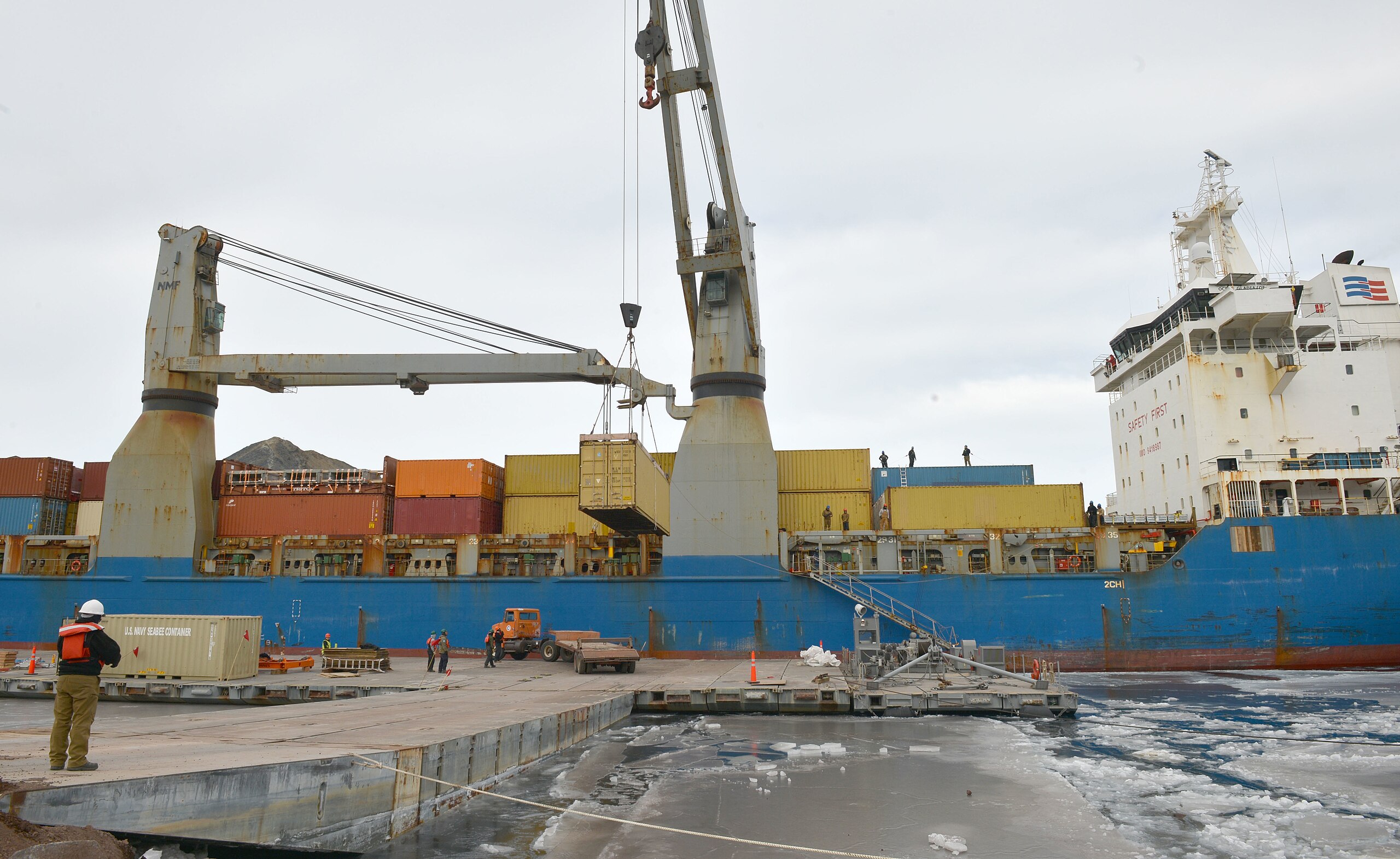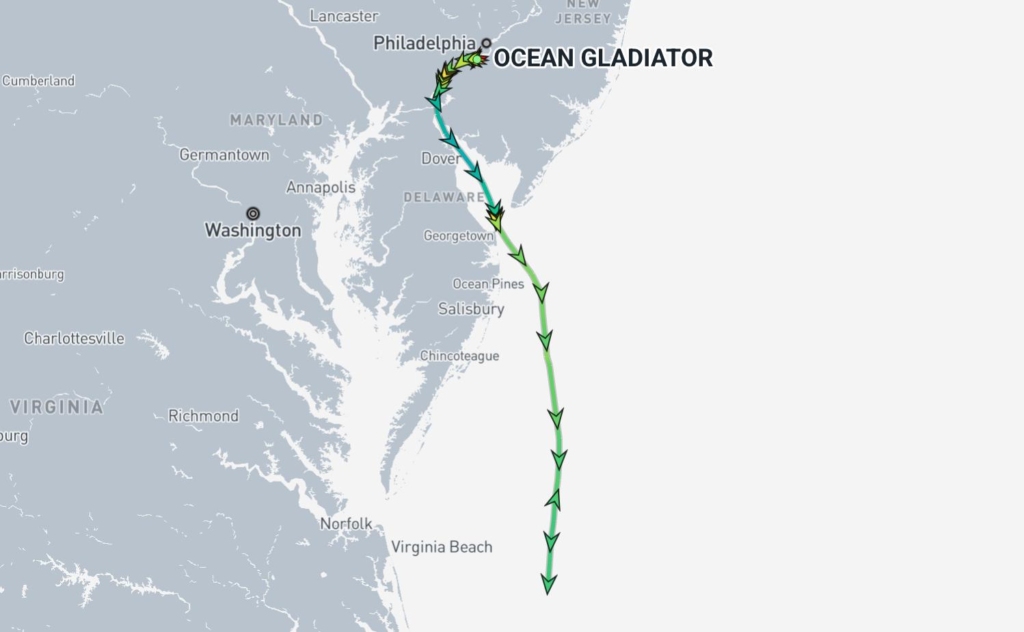162 Tons of Ammunition

On the morning of Friday, October 3, a sizable U.S.-flagged cargo ship named Ocean Gladiator departed the port of Paulsboro, New Jersey, loaded with up to 563 tons of military materiel partially produced by a German metals conglomerate. At the time of publication, the ship is currently heading south on the Atlantic shores for the port of Wilmington, North Carolina — where it is scheduled to pick up even more goods suspected to be for military use. Its final destination is the port of Ashdod in Israel. From there, large parts of the shipment are likely to be transported to Ramat HaSharon, a suburb of Tel Aviv and home to Elbit, one of Israel’s leading weapons manufacturers.
Pictures taken last week show the blue-painted vessel, measuring 166 meters in length and 23 meters in width, as it was loaded at the New Jersey port, miles away from the city of Philadelphia. Shipping records obtained by the Irish outlet The Ditch and reviewed by the Diasporist show that the Ocean Gladiator is carrying empty bomb shells, and at least 150 crates, weighing 162 tons, labeled “brass case cups.” These industrial brass blanks are semi-finished components used in the production of cartridge cases and bullet jackets. The shipment traces back to a factory in Buffalo, New York, owned by the Wieland group, a German metals conglomerate and a leading supplier of copper and brass products.
The involvement of Germany and German owned industries have been essential in arming Israel for the last two years as it has waged war in the occupied Palestinian territories. Chancellor Friedrich Merz’s recent decision to stop licensing the delivery of weapons that might be used in Gaza made headlines in August. Yet as a previous Diasporist investigation revealed, the transfer of weapon parts that are used in Gaza continued to transit through Germany during August and September, as did the shipment of already-licensed deliveries from Germany. However, the involvement of German companies in this armament goes even further.

Painful Compromises
Wieland is one of Germany’s leading companies in the copper industry. With 84 factories worldwide, it has operated for more than 200 years. Founded in Ulm in 1820, it became a key player in the national metal sector. During the Nazi regime, the company profited greatly from its integration into the war economy, producing ammunition components and using forced labor. On its website, the company describes at length its role as a Nazi model enterprise, but emphasizes that although its leaders held high positions in the regime’s economic associations, they “were certainly not convinced Nazis.” Rather, it claims that a “sense of responsibility for the company” forced them into making “painful compromises” during this “difficult time.”
Wieland, which today employs more than 9,500 people worldwide, is proud of the way it has confronted its past. In 2000, it contributed to the Remembrance, Responsibility and Future compensation fund initiated by the German federal government. In its Code of Conduct, it declares respect for “the fundamental principles of the Universal Declaration of Human Rights in accordance with the UN Guiding Principles on Business and Human Rights” and emphasizes that it also “expects this understanding and strict compliance from our business partners.”
When asked by the Diasporist how it reconciles its stated commitment to human rights with supplying tons of material to Israel’s leading weapons manufacturer amid the ongoing assault on Gaza, the company offered no response by the time of publication. According to Nadija Samour, a German Palestinian lawyer, Germany’s Code of Crimes against International Law obliges the state attorney to open investigations into the aiding and abetting of genocide when Germans are involved. Such crimes fall under German jurisdiction even when committed by a German company operating from a factory in the United States.

Under the Spotlight
As a new report to the UN Human Rights Committee joins the dozens of other institutions in describing Israel’s assault on Gaza as genocide, the global spotlight on material support for the Israeli military — which continues to be responsible for scores of Palestinian civilian deaths each day — is intensifying. Across Europe, dockworkers are coordinating to block shipments of military equipment bound for Israel, while legal challenges are multiplying at the national level.
On September 19, a coalition of lawyers and human rights activists formally filed a criminal complaint against former and current German government officials, accusing them of aiding and abetting war crimes, crimes against humanity, and the crime of genocide in Gaza. The complaint also targeted four executives from the domestic arms industry, including leaders of Rolls-Royce Solutions, Dynamit Nobel Defense, and the RENK Group, which supplies engines for Israeli tanks. At a press conference, lawyer Benjamin Düsberg explained that these four companies were highlighted because of direct evidence linking them to crimes committed in Gaza, while stressing that the state attorney must also investigate other domestic firms involved in arming Israeli forces.
Although Wieland wasn’t named in this complaint, it risks finding itself cited in future proceedings. Yet whether such threat of legal accountability could still force the Wieland group — and the shipment — to change course remains highly doubtful.
Not waiting for a legal remedy, activists in the United States have already taken matters into their own hands, blocking operations yesterday at Port Elizabeth, New Jersey, seeking to stop the export of other such military goods to Israel. In the meantime, the Ocean Gladiator is heading to Wilmington, where it is expected to dock early in the morning on October 5. From there, the shipment will proceed across the Atlantic and through the Strait of Gibraltar to Ashdod, where it is scheduled to arrive on October 23.
Inquiries by The Diasporist to the local branches of the International Longshoremen’s Association (ILA) in New Jersey and North Carolina — which represent most dockworkers on the East Coast of the U.S. — asking whether they would follow their European counterparts in refusing to load weapons for Israel, went unanswered by the time of publication.
